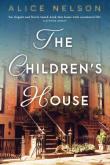AustLit
Latest Issues
AbstractHistoryArchive Description
'Marina, 'the gypsy scholar', a writer and academic, and her psychoanalyst husband, Jacob, were each born on a kibbutz in Israel. They meet years later at a university in California, Marina a grad student and Jacob a successful practitioner and teacher who has a young son, Ben, from a disastrous marriage. The family moves to a brownstone in Harlem, formerly a shelter run by elderly nuns.
'Outside the house one day Marina encounters Constance, a young refugee from Rwanda, and her toddler, Gabriel. Unmoored and devastated, Constance and Gabriel quickly come to depend on Marina; and her bond with Gabriel intensifies.
'When out of the blue Marina learns some disturbing news about her mother, Gizela, she leaves New York in search of the loose ends of her life. As Christmas nears, her tight-knit, loving family, with Constance and Gabriel, join Marina in her mother's former home, with a startling, life-changing consequence.' (Publication summary)
Notes
-
Published For Danny Shub
-
Epigraph: There is remembrance, and communion, altogether human and unhallowed. For families will not be broken. Curse and expel them, send their children wandering, drown them in floods and fires, and old women will make ongs out of all these sorrows and sit in the porches and sing them on mild evenings. Every sorrow suggests a thousand songs, and every song recalls a thousand sorrows, and so they are infinite in number, and all the same. -Housekeeping, Marilynne Robinson
Publication Details of Only Known VersionEarliest 2 Known Versions of
Other Formats
- Also dyslexic edition
- Also large print.
- Also braille.
- Sound recording.
Works about this Work
-
Marina and Constance
2018
single work
review
— Appears in: Australian Book Review , October no. 405 2018; (p. 48)'What are the limits of maternal love? How do children fare in its absence? Is mothering a socialised behaviour or a biological impulse? These are the questions Alice Nelson pursues in her second novel, The Children’s House, which draws its title from the name given to the separate quarters alloted to children in the communal child-rearing characteristic of life in kibbutzim in Israel. The idea underpinning this parenting model is utopian, egalitarian, and socialist: the community, rather than the mother or father, assumes responsibility for the child; the parents, alleviated from the financial burden of caretaking, are free to pursue bonding and love in a way that capitalist imperatives preclude.' (Introduction)
-
Marina and Constance
2018
single work
review
— Appears in: Australian Book Review , October no. 405 2018; (p. 48)'What are the limits of maternal love? How do children fare in its absence? Is mothering a socialised behaviour or a biological impulse? These are the questions Alice Nelson pursues in her second novel, The Children’s House, which draws its title from the name given to the separate quarters alloted to children in the communal child-rearing characteristic of life in kibbutzim in Israel. The idea underpinning this parenting model is utopian, egalitarian, and socialist: the community, rather than the mother or father, assumes responsibility for the child; the parents, alleviated from the financial burden of caretaking, are free to pursue bonding and love in a way that capitalist imperatives preclude.' (Introduction)
Awards
- 2019 longlisted ASAL Awards — ALS Gold Medal
- 2019 longlisted Australian Book Industry Awards (ABIA) — Australian Literary Fiction Book of the Year
- 2019 longlisted Indie Awards — Fiction
-
Harlem,
New York (City),
New York (State),
cUnited States of America (USA),cAmericas,
-
cIsrael,cMiddle East, Asia,






